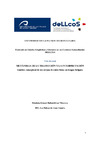Please use this identifier to cite or link to this item:
https://accedacris.ulpgc.es/jspui/handle/10553/107280
| DC Field | Value | Language |
|---|---|---|
| dc.contributor.advisor | Martín De León, Celia | es |
| dc.contributor.author | Baltadzhiyan Vitanova, Elizabeta Eduard | es |
| dc.date.accessioned | 2021-05-24T15:16:27Z | - |
| dc.date.available | 2021-05-24T15:16:27Z | - |
| dc.date.issued | 2021 | - |
| dc.identifier.other | Tercer Ciclo | |
| dc.identifier.uri | https://accedacris.ulpgc.es/handle/10553/107280 | - |
| dc.description | Programa de Doctorado en Estudios Lingüísticos y Literarios en sus Contextos Socioculturales por la Universidad de Las Palmas de Gran Canaria | en_US |
| dc.description.abstract | This thesis presents a corpus study on the metaphors of translation and interpreting. The corpus is made up of 38 interviews with contemporary Bulgarian translators and interpreters talking about their professional activity, which extends from 1923 to 2012. The theoretical framework of our research is constituted by the second generation cognitive sciences, in particular, the Conceptual Metaphor Theory. The aim of the work is to explore the metaphorical conceptualization of translation, interpreting, and communication in the Bulgarian language, to investigate whether the Bulgarian sociocultural and political environment has led to the emergence of specific metaphors, and to find out if and how particularities of Bulgarian history have been reflected in the formation of these concepts. The thesis consists of ten chapters grouped into two main blocks: the chapters of block A are dedicated to the theoretical foundations of the thesis, while those of block B present the results of the study. We identified 952 metaphorical instances corresponding to 611 vehicles by applying the Metaphor Identification Procedure of PRAGGLEJAZ group (2007). Then we have formulated and analyzed 117 conceptual metaphors. The prominent connections between some of the most frequent metaphors in this study have motivated the description of some scenarios (TRAVEL, ART, PERCEPTION, PLEASURE, SUFFERING, EXCHANGE VALUE, WAR, CONSTRUCTION, AND COMPOSITION/ DECOMPOSITION) that offer a coherent view of some aspects of translation and interpretation. These scenarios allowed us to reconstruct some implicit theories of the interviewed translators and interpreters. Four of the five hypotheses raised in section 6.2 have been confirmed. First, we could find in our corpus the main metaphors of translation identified in Western European translation studies: LANGUAGE IS A CONTAINER, TRANSLATION IS A TRANSFER, INTERPRETATION IS A TRANSFER, and RELATIONSHIPS BETWEEN AUTHORS AND TRANSLATORS ARE SENTIMENTAL RELATIONSHIPS. Second, according to our expectations, the Bulgarian translators and interpreters also used another frequent metaphor when discussing their professional life (A PROFESSIONAL CAREER IS A JOURNEY). The conceptual metaphor PUBLISHING AND CENSORSHIP ARE OPPOSITE FORCES found in this thesis alludes to the opposition of the Bulgarian government to the expansion of the ideological framework proposed by the innovative editorial policies introduced in the pre-Perestroika era, which confirmed our third hypothesis. The forth hypothesis was partially confirmed by the identification of metaphors from the conceptual field of ART that reflect the policy of support for translation in the time previous to the Perestroika. However, the financial problems of the post-Perestroika years were not expressed metaphorically. The fifth hypothesis related to the Bulgarian tradition in the use of metaphorical expressions from the conceptual field of ART in sociocultural discourse has been confirmed by the metaphors of the artistic conceptual field TRANSLATION/INTERPRETATION IS AN ART AND TRANSLATING/INTERPRETING IS MAKING A THEATER SHOW. Moreover, our results suggest the emergence of metaphors related to Bulgarian political and cultural life during the socialist era (those of WAR and SUPERMAN), which could be specific to Bulgarian culture. | en_US |
| dc.language | spa | en_US |
| dc.subject | 570112 Traducción | en_US |
| dc.subject | 570113 Lingüística aplicada a la traducción e interpretación | en_US |
| dc.subject | 570507 Psicolingüística | en_US |
| dc.title | Metáforas de la traducción y la interpretación: Análisis conceptual de un corpus de entrevistas en lengua búlgaro | es |
| dc.title.alternative | Metaphors of Translation and Interpreting: Conceptual analysis of a corpus of interviews in Bulgarian language | en_US |
| dc.type | info:eu-repo/semantics/doctoralThesis | en_US |
| dc.type | Thesis | en_US |
| dc.type | Thesis | en_US |
| dc.investigacion | Artes y Humanidades | en_US |
| dc.type2 | Tesis doctoral | en_US |
| dc.utils.revision | Sí | en_US |
| dc.identifier.matricula | TESIS-1743761 | es |
| dc.identifier.ulpgc | Sí | en_US |
| dc.contributor.buulpgc | BU-HUM | es |
| dc.contributor.programa | Programa de Doctorado en Estudios Lingüísticos y Literarios en sus Contextos Socioculturales por la Universidad de Las Palmas de Gran Canaria | - |
| item.grantfulltext | open | - |
| item.fulltext | Con texto completo | - |
| crisitem.advisor.dept | GIR IATEXT: Cognición, Lingüística, Texto y Procesamiento de la Información | - |
| crisitem.advisor.dept | IU de Análisis y Aplicaciones Textuales | - |
| crisitem.advisor.dept | Departamento de Filología Moderna, Traducción e Interpretación | - |
| crisitem.author.fullName | Baltadzhiyan Vitanova, Elizabeta Eduard | - |
| Appears in Collections: | Tesis doctoral | |
Page view(s) 10
146
checked on Jan 10, 2026
Download(s)
829
checked on Jan 10, 2026
Google ScholarTM
Check
Share
Export metadata
Items in accedaCRIS are protected by copyright, with all rights reserved, unless otherwise indicated.
